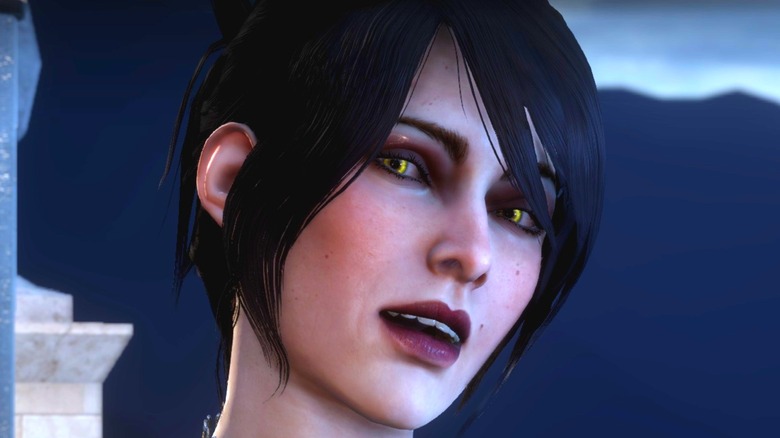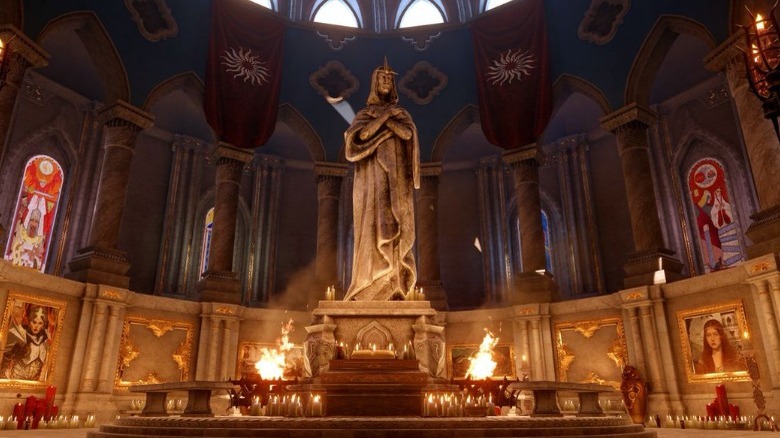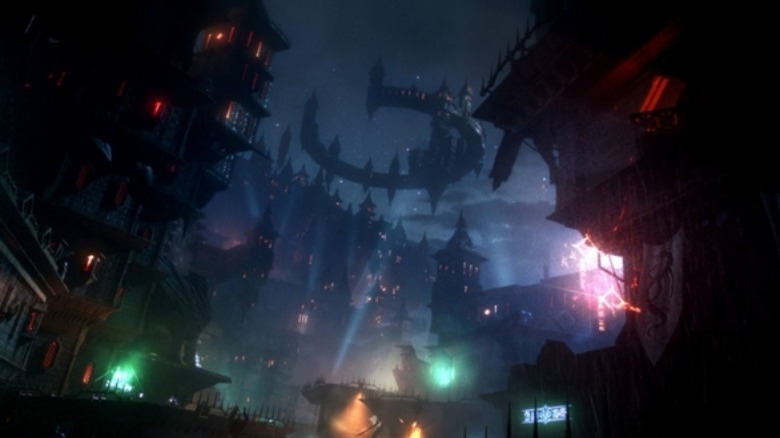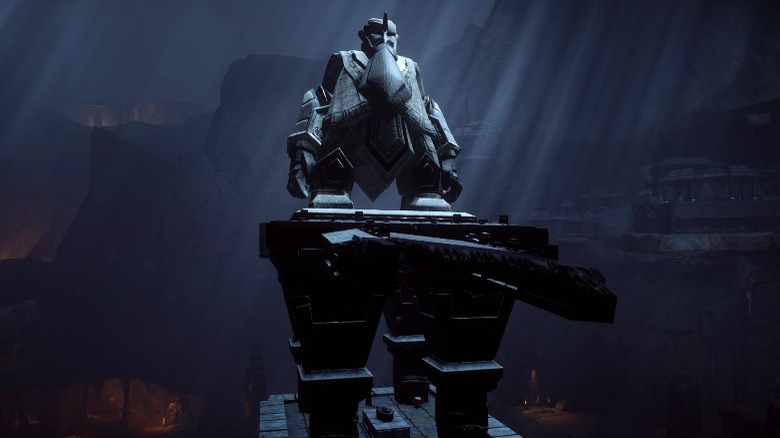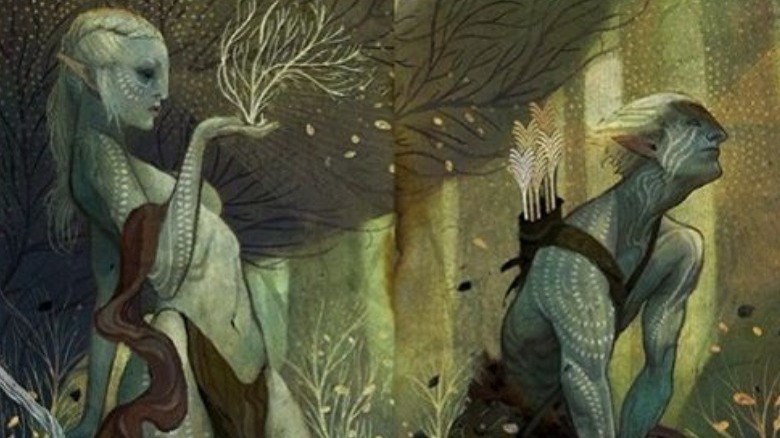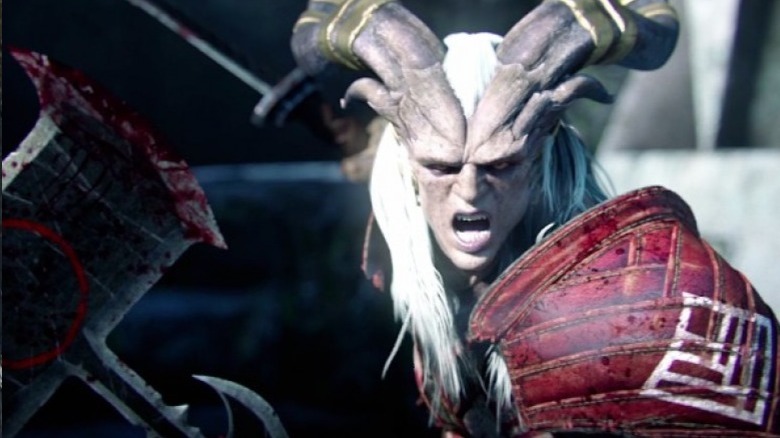The Mythology In Dragon Age Explained
"Dragon Age" is a game series which is dense with lore. Nothing in the realm of magic and monsters is ever as simple as it seems. Sure, there's plenty of action, romance and comedy to be enjoyed, but the series is an epic fantasy at its core. That means it's built around a complex world with it's own languages, religions, social systems, politics, and myths. The main campaign is good at giving the player all the information they need to understand the plot, but there's always more. Players have to comb through dozens of NPC conversations and hundreds of codex entries if they want to learn it all.
The various mythological systems that were created for the dangerous world of Thedas are surprisingly complex, and understanding them can go a long way towards understanding the motivations of the people living there. Much of the series involves exploring the origins of these myths and learning to separate the fact from the fiction. There are several fantasy races in the games that each have their own belief systems, but there are also several examples of individuals whose beliefs cross racial divides. Here is an overview of the five major belief systems in Thedas.
Chantry Mythology
The Chantry (a.k.a. Andrastianism) is considered the dominant religion across Thedas. It's the one players are likely to encounter the most frequently as it is the primary religion practiced by most humans and spans Ferelden, The Free Marches and Orlais — the three countries in which the games have been set. Much of the Chantry's lore seems to be based on Christianity. It is monotheistic and revolves around the story of a prophet who was martyred. It has a hierarchical priesthood, with the leader being an elected "Divine" who is always female.
The story goes that Andraste lived back when all of Southern Thedas was under the control of the Tevinter Imperium. She eventually began to see herself as the conduit to the one true god of their world who she called The Maker. By his will, she led an Exalted March against Tevinter and liberated a large swath of territory. She was later betrayed by her husband Maferath and burned at the stake by the Tevinter Archon.
The goal of the chantry is to spread the doctrine written by Andraste, the Chant of Light, to every race in every corner of the world. They've been fairly successful in their goal, as the Quinai are the only race to not have any Andrastian members featured in the series. It's also worth noting that the Templars responsible for imprisoning mages also answer to the Chantry, often citing the passage from the chant which states: "Magic exists to serve man, and never to rule over him."
Tevinter Mythology
The Tevinter Imperium is ruled by mages and is considered one of the more influential nations in Thedas. It was once a massive empire similar to Rome which spanned most of the continent. It has since suffered a decline, but still rivals the largest nations in both size and influence.
The ancient Tevinters worshipped entities in the form of dragons known as the Old Gods. They did not attribute the creation of the world to these deities, but they did believe that the creatures were the ones who first taught mages to wield magic. It's unknown whether the Old Gods are ordinary dragons or something more, but they burrowed into the earth to hibernate centuries ago and are only awakened when the darkspawn find them and corrupt them into archdemons.
Some still follow the Old Gods in Tevinter, but most have turned to a unique version of Andrastianism. In the Tevinter version, the Imperium isn't responsible for Andraste's execution. They also have their own Divine, although this figure is always male. According to Dorian Pavus, a companion players can get in "Dragon Age: Inquisition," the main difference between the Southern Chantry and the Imperium Chantry is "the whole 'Magic is meant to serve man, not rule over him' business. Back home, ruling the unwashed masses is serving them."
Players will likely learn more about the various faiths of the Imperium in "Dragon Age 4" since rumors and spoilers seem to indicate that's where the game will be set.
Dwarven Mythology
Dwarves are often separated in Thedas by those who live in the underground city of Orzimar and those who have left to become "surfacers." Many surface dwarves convert to Andrastianism. One of the more notable examples is Varric Tethras, a companion in both "Dragon Age 2" and "Inquisition."
Those who still live underground have certain myths and beliefs that guide their society. Instead of gods, most dwarves are taught stories about dwarves that exemplified the best attributes of their people known as "Paragons." They pray to their ancestors and ask them to watch over them.
The dwarves also recognize an entity called The Stone. They believe that the dwarven race is born of The Stone and some can even receive guidance from it with a unique ability they refer to as "Stone sense," which can be lost after they spend time on the surface. The subject is explored much more thoroughly in "The Descent" DLC from "Inquisition." A temporary dwarven companion named Renn explains, "We don't worship her, but we do respect and honor her." Another temporary companion named Valta adds, "The Stone makes us strong, and we return that strength to her when we die. It's difficult to express in words."
Elven Mythology
Like dwarves, there are many elves who follow religions established by other races such The Chantry or The Qun, but some still follow the pantheon set out by their ancestors. This belief system is primarily practiced by the nomadic tribes of Dalish elves who maintain it as a means of preserving their history. There are a few examples of elves living among the humans who have attempted to follow this faith, such as an elderly widower who asks the Inquisitor to place flowers on the grave of his wife, but knowledge about the religion and its associated stories isn't widespread outside of the clans.
The elven theological system has two different groups of gods. The nine gods which followers pray to are called the Evanuris. They are referred to as "the Creators" and are led by Elgar'nan, the god of fatherhood and vengeance. The second group is simply referred to as The Forgotten Ones. Not much is known about them except that they were at war with the Evanuris. The Dalish believe that their gods were sealed away by Fen'Harel (a.k.a the Dread Wolf) and can no longer answer their prayers.
The ending of the "Trespasser" DLC reveals that the truth is more complicated. Fen'Harel was actually a liberator and the Evanuris were not gods, but powerful mages who had enslaved thousands of elves.
Qunari Mythology
The Qun is a code of honor, philosophy, law and social architecture laid down by the prophet Ashakaari Koslun. It's a common misconception that the term Qunari refers to the race of ashen skinned giants who practice it, but that isn't strictly true. The word Qunari literally translates to "people of the Qun." It's an umbrella term for all peoples who live under its rules.
You are granted three Qunari companions across the "Dragon Age" games. There's Sten in "Origins," an elven Qunari named Tallis in the "Mark of the Assassin" DLC for "Dragon Age 2," and the Iron Bull in "Dragon Age: Inquisition." When asked how the Qunari rule themselves, Iron Bull explains, "It's pretty simple. We've got the matriarchy, the priesthood, and the military. The priesthood figures out how Qunari should live in theory. The matriarchy makes it work in practice, and the military keeps the Qunari safe from outside threats."
The Qun doesn't follow any gods or deities. The priesthood's main focus is guiding Qunari society by interpreting the teaching of Koslun. Iron Bull does reveal after the Inquisitor kills their first dragon that, "Qunari hold dragons sacred. Well, as much as we hold anything sacred ... Atashi. "The Glorious Ones." That's our word for them." He's quick to reassure the Inquisitor that they don't believe dragons are gods like the people from Tevinter, however.

